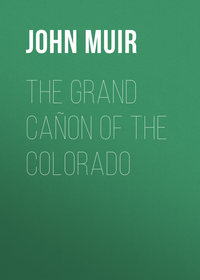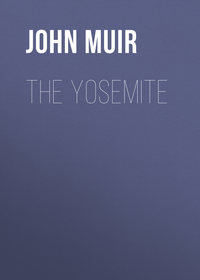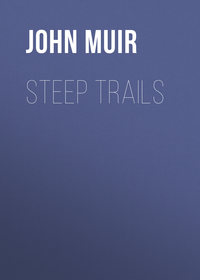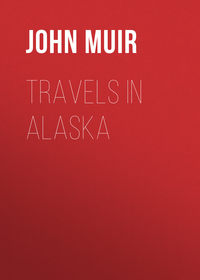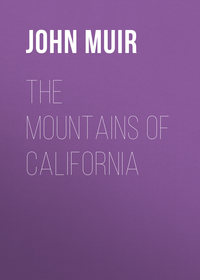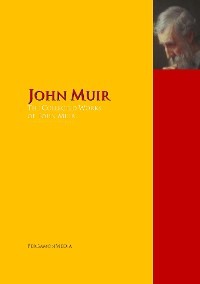 полная версия
полная версияThe Story of My Boyhood and Youth
Not less exciting and memorable was Audubon's wonderful story of the passenger pigeon, a beautiful bird flying in vast flocks that darkened the sky like clouds, countless millions assembling to rest and sleep and rear their young in certain forests, miles in length and breadth, fifty or a hundred nests on a single tree; the overloaded branches bending low and often breaking; the farmers gathering from far and near, beating down countless thousands of the young and old birds from their nests and roosts with long poles at night, and in the morning driving their bands of hogs, some of them brought from farms a hundred miles distant, to fatten on the dead and wounded covering the ground.
In another of our reading-lessons some of the American forests were described. The most interesting of the trees to us boys was the sugar maple, and soon after we had learned this sweet story we heard everybody talking about the discovery of gold in the same wonder-filled country.
One night, when David and I were at grandfather's fireside solemnly learning our lessons as usual, my father came in with news, the most wonderful, most glorious, that wild boys ever heard. "Bairns," he said, "you needna learn your lessons the nicht, for we're gan to America the morn!" No more grammar, but boundless woods full of mysterious good things; trees full of sugar, growing in ground full of gold; hawks, eagles, pigeons, filling the sky; millions of birds' nests, and no gamekeepers to stop us in all the wild, happy land. We were utterly, blindly glorious. After father left the room, grandfather gave David and me a gold coin apiece for a keepsake, and looked very serious, for he was about to be deserted in his lonely old age. And when we in fullness of young joy spoke of what we were going to do, of the wonderful birds and their nests that we should find, the sugar and gold, etc., and promised to send him a big box full of that tree sugar packed in gold from the glorious paradise over the sea, poor lonely grandfather, about to be forsaken, looked with downcast eyes on the floor and said in a low, trembling, troubled voice, "Ah, poor laddies, poor laddies, you'll find something else ower the sea forbye gold and sugar, birds' nests and freedom fra lessons and schools. You'll find plenty hard, hard work." And so we did. But nothing he could say could cloud our joy or abate the fire of youthful, hopeful, fearless adventure. Nor could we in the midst of such measureless excitement see or feel the shadows and sorrows of his darkening old age. To my schoolmates, met that night on the street, I shouted the glorious news, "I'm gan to Amaraka the morn!" None could believe it. I said, "Weel, just you see if I am at the skule the morn!"
Next morning we went by rail to Glasgow and thence joyfully sailed away from beloved Scotland, flying to our fortunes on the wings of the winds, care-free as thistle seeds. We could not then know what we were leaving, what we were to encounter in the New World, nor what our gains were likely to be. We were too young and full of hope for fear or regret, but not too young to look forward with eager enthusiasm to the wonderful schoolless bookless American wilderness. Even the natural heart-pain of parting from grandfather and grandmother Gilrye, who loved us so well, and from mother and sisters and brother was quickly quenched in young joy. Father took with him only my sister Sarah (thirteen years of age), myself (eleven), and brother David (nine), leaving my eldest sister, Margaret, and the three youngest of the family, Daniel, Mary, and Anna, with mother, to join us after a farm had been found in the wilderness and a comfortable house made to receive them.
In crossing the Atlantic before the days of steamships, or even the American clippers, the voyages made in old-fashioned sailing-vessels were very long. Ours was six weeks and three days. But because we had no lessons to get, that long voyage had not a dull moment for us boys. Father and sister Sarah, with most of the old folk, stayed below in rough weather, groaning in the miseries of seasickness, many of the passengers wishing they had never ventured in "the auld rockin' creel," as they called our bluff-bowed, wave-beating ship, and, when the weather was moderately calm, singing songs in the evenings,—"The Youthful Sailor Frank and Bold," "Oh, why left I my hame, why did I cross the deep," etc. But no matter how much the old tub tossed about and battered the waves, we were on deck every day, not in the least seasick, watching the sailors at their rope-hauling and climbing work; joining in their songs, learning the names of the ropes and sails, and helping them as far as they would let us; playing games with other boys in calm weather when the deck was dry, and in stormy weather rejoicing in sympathy with the big curly-topped waves.
The captain occasionally called David and me into his cabin and asked us about our schools, handed us books to read, and seemed surprised to find that Scotch boys could read and pronounce English with perfect accent and knew so much Latin and French. In Scotch schools only pure English was taught, although not a word of English was spoken out of school. All through life, however well educated, the Scotch spoke Scotch among their own folk, except at times when unduly excited on the only two subjects on which Scotchmen get much excited, namely religion and politics. So long as the controversy went on with fairly level temper, only gude braid Scots was used, but if one became angry, as was likely to happen, then he immediately began speaking severely correct English, while his antagonist, drawing himself up, would say: "Weel, there's na use pursuing this subject ony further, for I see ye hae gotten to your English."
As we neared the shore of the great new land, with what eager wonder we watched the whales and dolphins and porpoises and seabirds, and made the good-natured sailors teach us their names and tell us stories about them!
There were quite a large number of emigrants aboard, many of them newly married couples, and the advantages of the different parts of the New World they expected to settle in were often discussed. My father started with the intention of going to the backwoods of Upper Canada. Before the end of the voyage, however, he was persuaded that the States offered superior advantages, especially Wisconsin and Michigan, where the land was said to be as good as in Canada and far more easily brought under cultivation; for in Canada the woods were so close and heavy that a man might wear out his life in getting a few acres cleared of trees and stumps. So he changed his mind and concluded to go to one of the Western States.
On our wavering westward way a grain-dealer in Buffalo told father that most of the wheat he handled came from Wisconsin; and this influential information finally determined my father's choice. At Milwaukee a farmer who had come in from the country near Fort Winnebago with a load of wheat agreed to haul us and our formidable load of stuff to a little town called Kingston for thirty dollars. On that hundred-mile journey, just after the spring thaw, the roads over the prairies were heavy and miry, causing no end of lamentation, for we often got stuck in the mud, and the poor farmer sadly declared that never, never again would he be tempted to try to haul such a cruel, heart-breaking, wagon-breaking, horse-killing load, no, not for a hundred dollars. In leaving Scotland, father, like many other homeseekers, burdened himself with far too much luggage, as if all America were still a wilderness in which little or nothing could be bought. One of his big iron-bound boxes must have weighed about four hundred pounds, for it contained an old-fashioned beam-scales with a complete set of cast-iron counterweights, two of them fifty-six pounds each, a twenty-eight, and so on down to a single pound. Also a lot of iron wedges, carpenter's tools, and so forth, and at Buffalo, as if on the very edge of the wilderness, he gladly added to his burden a big cast-iron stove with pots and pans, provisions enough for a long siege, and a scythe and cumbersome cradle for cutting wheat, all of which he succeeded in landing in the primeval Wisconsin woods.
A land-agent at Kingston gave father a note to a farmer by the name of Alexander Gray, who lived on the border of the settled part of the country, knew the section-lines, and would probably help him to find a good place for a farm. So father went away to spy out the land, and in the mean time left us children in Kingston in a rented room. It took us less than an hour to get acquainted with some of the boys in the village; we challenged them to wrestle, run races, climb trees, etc., and in a day or two we felt at home, carefree and happy, notwithstanding our family was so widely divided. When father returned he told us that he had found fine land for a farm in sunny open woods on the side of a lake, and that a team of three yoke of oxen with a big wagon was coming to haul us to Mr. Gray's place.
We enjoyed the strange ten-mile ride through the woods very much, wondering how the great oxen could be so strong and wise and tame as to pull so heavy a load with no other harness than a chain and a crooked piece of wood on their necks, and how they could sway so obediently to right and left past roadside trees and stumps when the driver said haw and gee. At Mr. Gray's house, father again left us for a few days to build a shanty on the quarter-section he had selected four or five miles to the westward. In the mean while we enjoyed our freedom as usual, wandering in the fields and meadows, looking at the trees and flowers, snakes and birds and squirrels. With the help of the nearest neighbors the little shanty was built in less than a day after the rough bur-oak logs for the walls and the white-oak boards for the floor and roof were got together.
To this charming hut, in the sunny woods, overlooking a flowery glacier meadow and a lake rimmed with white water-lilies, we were hauled by an ox-team across trackless carex swamps and low rolling hills sparsely dotted with round-headed oaks. Just as we arrived at the shanty, before we had time to look at it or the scenery about it, David and I jumped down in a hurry off the load of household goods, for we had discovered a blue jay's nest, and in a minute or so we were up the tree beside it, feasting our eyes on the beautiful green eggs and beautiful birds,—our first memorable discovery. The handsome birds had not seen Scotch boys before and made a desperate screaming as if we were robbers like themselves; though we left the eggs untouched, feeling that we were already beginning to get rich, and wondering how many more nests we should find in the grand sunny woods. Then we ran along the brow of the hill that the shanty stood on, and down to the meadow, searching the trees and grass tufts and bushes, and soon discovered a bluebird's and a woodpecker's nest, and began an acquaintance with the frogs and snakes and turtles in the creeks and springs.
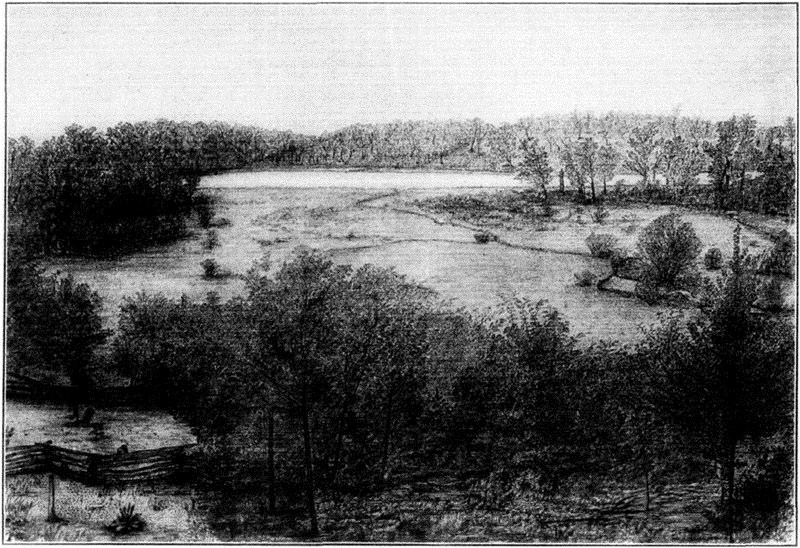
MUIR'S LAKE (FOUNTAIN LAKE) AND THE GARDEN MEADOW
Sketched from the roof of the Bur-Oak Shanty
This sudden plash into pure wildness—baptism in Nature's warm heart—how utterly happy it made us! Nature streaming into us, wooingly teaching her wonderful glowing lessons, so unlike the dismal grammar ashes and cinders so long thrashed into us. Here without knowing it we still were at school; every wild lesson a love lesson, not whipped but charmed into us. Oh, that glorious Wisconsin wilderness! Everything new and pure in the very prime of the spring when Nature's pulses were beating highest and mysteriously keeping time with our own! Young hearts, young leaves, flowers, animals, the winds and the streams and the sparkling lake, all wildly, gladly rejoicing together!
Next morning, when we climbed to the precious jay nest to take another admiring look at the eggs, we found it empty. Not a shell-fragment was left, and we wondered how in the world the birds were able to carry off their thin-shelled eggs either in their bills or in their feet without breaking them, and how they could be kept warm while a new nest was being built. Well, I am still asking these questions. When I was on the Harriman Expedition I asked Robert Ridgway, the eminent ornithologist, how these sudden flittings were accomplished, and he frankly confessed that he didn't know, but guessed that jays and many other birds carried their eggs in their mouths; and when I objected that a jay's mouth seemed too small to hold its eggs, he replied that birds' mouths were larger than the narrowness of their bills indicated. Then I asked him what he thought they did with the eggs while a new nest was being prepared. He didn't know; neither do I to this day. A specimen of the many puzzling problems presented to the naturalist.
We soon found many more nests belonging to birds that were not half so suspicious. The handsome and notorious blue jay plunders the nests of other birds and of course he could not trust us. Almost all the others—brown thrushes, bluebirds, song sparrows, kingbirds, hen-hawks, nighthawks, whip-poor-wills, woodpeckers, etc.—simply tried to avoid being seen, to draw or drive us away, or paid no attention to us.
We used to wonder how the woodpeckers could bore holes so perfectly round, true mathematical circles. We ourselves could not have done it even with gouges and chisels. We loved to watch them feeding their young, and wondered how they could glean food enough for so many clamorous, hungry, unsatisfiable babies, and how they managed to give each one its share; for after the young grew strong, one would get his head out of the door-hole and try to hold possession of it to meet the food-laden parents. How hard they worked to support their families, especially the red-headed and speckledy woodpeckers and flickers; digging, hammering on scaly bark and decaying trunks and branches from dawn to dark, coming and going at intervals of a few minutes all the livelong day!
We discovered a hen-hawk's nest on the top of a tall oak thirty or forty rods from the shanty and approached it cautiously. One of the pair always kept watch, soaring in wide circles high above the tree, and when we attempted to climb it, the big dangerous-looking bird came swooping down at us and drove us away.
We greatly admired the plucky kingbird. In Scotland our great ambition was to be good fighters, and we admired this quality in the handsome little chattering flycatcher that whips all the other birds. He was particularly angry when plundering jays and hawks came near his home, and took pains to thrash them not only away from the nest-tree but out of the neighborhood. The nest was usually built on a bur oak near a meadow where insects were abundant, and where no undesirable visitor could approach without being discovered. When a hen-hawk hove in sight, the male immediately set off after him, and it was ridiculous to see that great, strong bird hurrying away as fast as his clumsy wings would carry him, as soon as he saw the little, waspish kingbird coming. But the kingbird easily overtook him, flew just a few feet above him, and with a lot of chattering, scolding notes kept diving and striking him on the back of the head until tired; then he alighted to rest on the hawk's broad shoulders, still scolding and chattering as he rode along, like an angry boy pouring out vials of wrath. Then, up and at him again with his sharp bill; and after he had thus driven and ridden his big enemy a mile or so from the nest, he went home to his mate, chuckling and bragging as if trying to tell her what a wonderful fellow he was.
This first spring, while some of the birds were still building their nests and very few young ones had yet tried to fly, father hired a Yankee to assist in clearing eight or ten acres of the best ground for a field. We found new wonders every day and often had to call on this Yankee to solve puzzling questions. We asked him one day if there was any bird in America that the kingbird couldn't whip. What about the sandhill crane? Could he whip that long-legged, long-billed fellow?
"A crane never goes near kingbirds' nests or notices so small a bird," he said, "and therefore there could be no fighting between them." So we hastily concluded that our hero could whip every bird in the country except perhaps the sandhill crane.
We never tired listening to the wonderful whip-poor-will. One came every night about dusk and sat on a log about twenty or thirty feet from our cabin door and began shouting "Whip poor Will! Whip poor Will!" with loud emphatic earnestness. "What's that? What's that?" we cried when this startling visitor first announced himself. "What do you call it?"
"Why, it's telling you its name," said the Yankee. "Don't you hear it and what he wants you to do? He says his name is 'Poor Will' and he wants you to whip him, and you may if you are able to catch him." Poor Will seemed the most wonderful of all the strange creatures we had seen. What a wild, strong, bold voice he had, unlike any other we had ever heard on sea or land!
A near relative, the bull-bat, or nighthawk, seemed hardly less wonderful. Towards evening scattered flocks kept the sky lively as they circled around on their long wings a hundred feet or more above the ground, hunting moths and beetles, interrupting their rather slow but strong, regular wing-beats at short intervals with quick quivering strokes while uttering keen, squeaky cries something like pfee, pfee, and every now and then diving nearly to the ground with a loud ripping, bellowing sound, like bull-roaring, suggesting its name; then turning and gliding swiftly up again. These fine wild gray birds, about the size of a pigeon, lay their two eggs on bare ground without anything like a nest or even a concealing bush or grass-tuft. Nevertheless they are not easily seen, for they are colored like the ground. While sitting on their eggs, they depend so much upon not being noticed that if you are walking rapidly ahead they allow you to step within an inch or two of them without flinching. But if they see by your looks that you have discovered them, they leave their eggs or young, and, like a good many other birds, pretend that they are sorely wounded, fluttering and rolling over on the ground and gasping as if dying, to draw you away. When pursued we were surprised to find that just when we were on the point of overtaking them they were always able to flutter a few yards farther, until they had led us about a quarter of a mile from the nest; then, suddenly getting well, they quietly flew home by a roundabout way to their precious babies or eggs, o'er a' the ills of life victorious, bad boys among the worst. The Yankee took particular pleasure in encouraging us to pursue them.
Everything about us was so novel and wonderful that we could hardly believe our senses except when hungry or while father was thrashing us. When we first saw Fountain Lake Meadow, on a sultry evening, sprinkled with millions of lightning-bugs throbbing with light, the effect was so strange and beautiful that it seemed far too marvelous to be real. Looking from our shanty on the hill, I thought that the whole wonderful fairy show must be in my eyes; for only in fighting, when my eyes were struck, had I ever seen anything in the least like it. But when I asked my brother if he saw anything strange in the meadow he said, "Yes, it's all covered with shaky fire-sparks." Then I guessed that it might be something outside of us, and applied to our all-knowing Yankee to explain it. "Oh, it's nothing but lightnin'-bugs," he said, and kindly led us down the hill to the edge of the fiery meadow, caught a few of the wonderful bugs, dropped them into a cup, and carried them to the shanty, where we watched them throbbing and flashing out their mysterious light at regular intervals, as if each little passionate glow were caused by the beating of a heart. Once I saw a splendid display of glow-worm light in the foothills of the Himalayas, north of Calcutta, but glorious as it appeared in pure starry radiance, it was far less impressive than the extravagant abounding, quivering, dancing fire on our Wisconsin meadow.
Partridge drumming was another great marvel. When I first heard the low, soft, solemn sound I thought it must be made by some strange disturbance in my head or stomach, but as all seemed serene within, I asked David whether he heard anything queer. "Yes," he said, "I hear something saying boomp, boomp, boomp, and I'm wondering at it." Then I was half satisfied that the source of the mysterious sound must be in something outside of us, coming perhaps from the ground or from some ghost or bogie or woodland fairy. Only after long watching and listening did we at last discover it in the wings of the plump brown bird.
The love-song of the common jack snipe seemed not a whit less mysterious than partridge drumming. It was usually heard on cloudy evenings, a strange, unearthly, winnowing, spiritlike sound, yet easily heard at a distance of a third of a mile. Our sharp eyes soon detected the bird while making it, as it circled high in the air over the meadow with wonderfully strong and rapid wing-beats, suddenly descending and rising, again and again, in deep, wide loops; the tones being very low and smooth at the beginning of the descent, rapidly increasing to a curious little whirling storm-roar at the bottom, and gradually fading lower and lower until the top was reached. It was long, however, before we identified this mysterious wing-singer as the little brown jack snipe that we knew so well and had so often watched as he silently probed the mud around the edges of our meadow stream and spring-holes, and made short zigzag flights over the grass uttering only little short, crisp quacks and chucks.
The love-songs of the frogs seemed hardly less wonderful than those of the birds, their musical notes varying from the sweet, tranquil, soothing peeping and purring of the hylas to the awfully deep low-bass blunt bellowing of the bullfrogs. Some of the smaller species have wonderfully clear, sharp voices and told us their good Bible names in musical tones about as plainly as the whip-poor-will. Isaac, Isaac; Yacob, Yacob; Israel, Israel; shouted in sharp, ringing, far-reaching tones, as if they had all been to school and severely drilled in elocution. In the still, warm evenings, big bunchy bullfrogs bellowed, Drunk! Drunk! Drunk! Jug o' rum! Jug o' rum! and early in the spring, countless thousands of the commonest species, up to the throat in cold water, sang in concert, making a mass of music, such as it was, loud enough to be heard at a distance of more than half a mile.
Far, far apart from this loud marsh music is that of the many species of hyla, a sort of soothing immortal melody filling the air like light.
We reveled in the glory of the sky scenery as well as that of the woods and meadows and rushy, lily-bordered lakes. The great thunderstorms in particular interested us, so unlike any seen in Scotland, exciting awful, wondering admiration. Gazing awe-stricken, we watched the upbuilding of the sublime cloud-mountains,—glowing, sun-beaten pearl and alabaster cumuli, glorious in beauty and majesty and looking so firm and lasting that birds, we thought, might build their nests amid their downy bosses; the black-browed storm-clouds marching in awful grandeur across the landscape, trailing broad gray sheets of hail and rain like vast cataracts, and ever and anon flashing down vivid zigzag lightning followed by terrible crashing thunder. We saw several trees shattered, and one of them, a punky old oak, was set on fire, while we wondered why all the trees and everybody and everything did not share the same fate, for oftentimes the whole sky blazed. After sultry storm days, many of the nights were darkened by smooth black apparently structureless cloud-mantles which at short intervals were illumined with startling suddenness to a fiery glow by quick, quivering lightning-flashes, revealing the landscape in almost noonday brightness, to be instantly quenched in solid blackness.
But those first days and weeks of unmixed enjoyment and freedom, reveling in the wonderful wildness about us, were soon to be mingled with the hard work of making a farm. I was first put to burning brush in clearing land for the plough. Those magnificent brush fires with great white hearts and red flames, the first big, wild outdoor fires I had ever seen, were wonderful sights for young eyes. Again and again, when they were burning fiercest so that we could hardly approach near enough to throw on another branch, father put them to awfully practical use as warning lessons, comparing their heat with that of hell, and the branches with bad boys. "Now, John," he would say,—"now, John, just think what an awful thing it would be to be thrown into that fire:—and then think of hellfire, that is so many times hotter. Into that fire all bad boys, with sinners of every sort who disobey God, will be cast as we are casting branches into this brush fire, and although suffering so much, their sufferings will never never end, because neither the fire nor the sinners can die." But those terrible fire lessons quickly faded away in the blithe wilderness air; for no fire can be hotter than the heavenly fire of faith and hope that burns in every healthy boy's heart.


